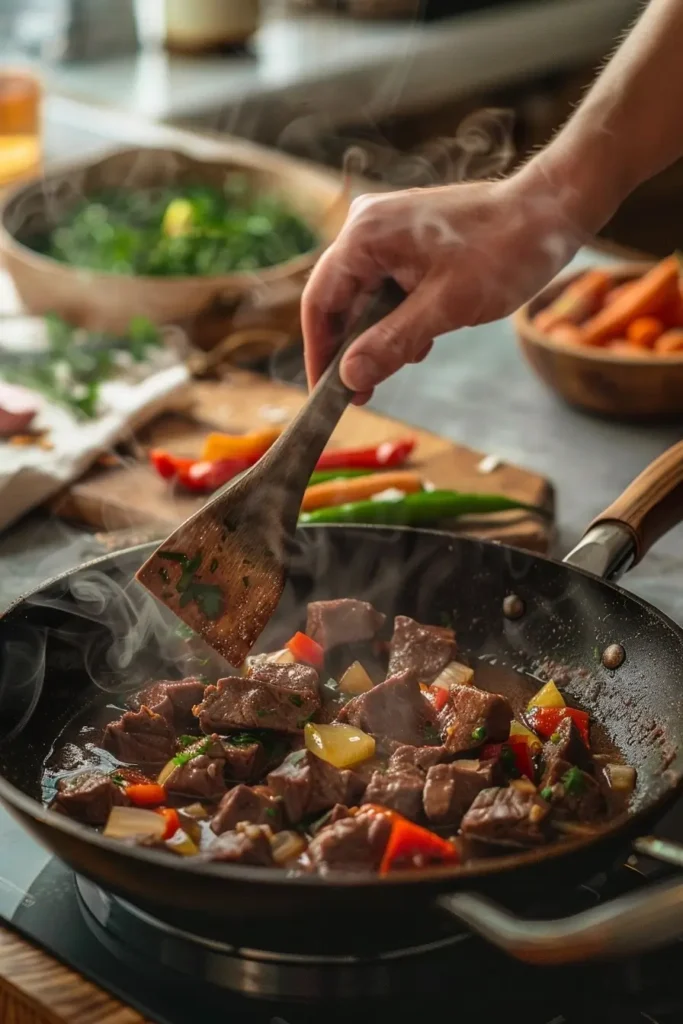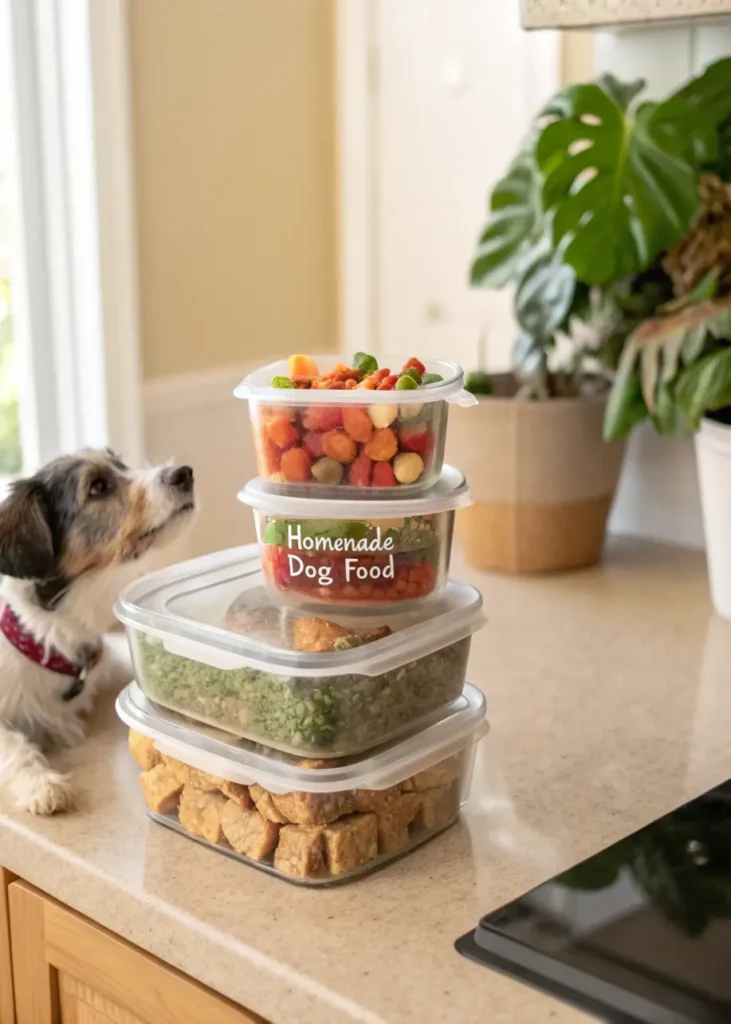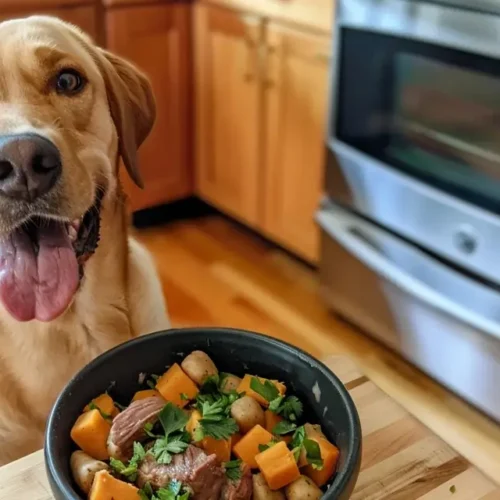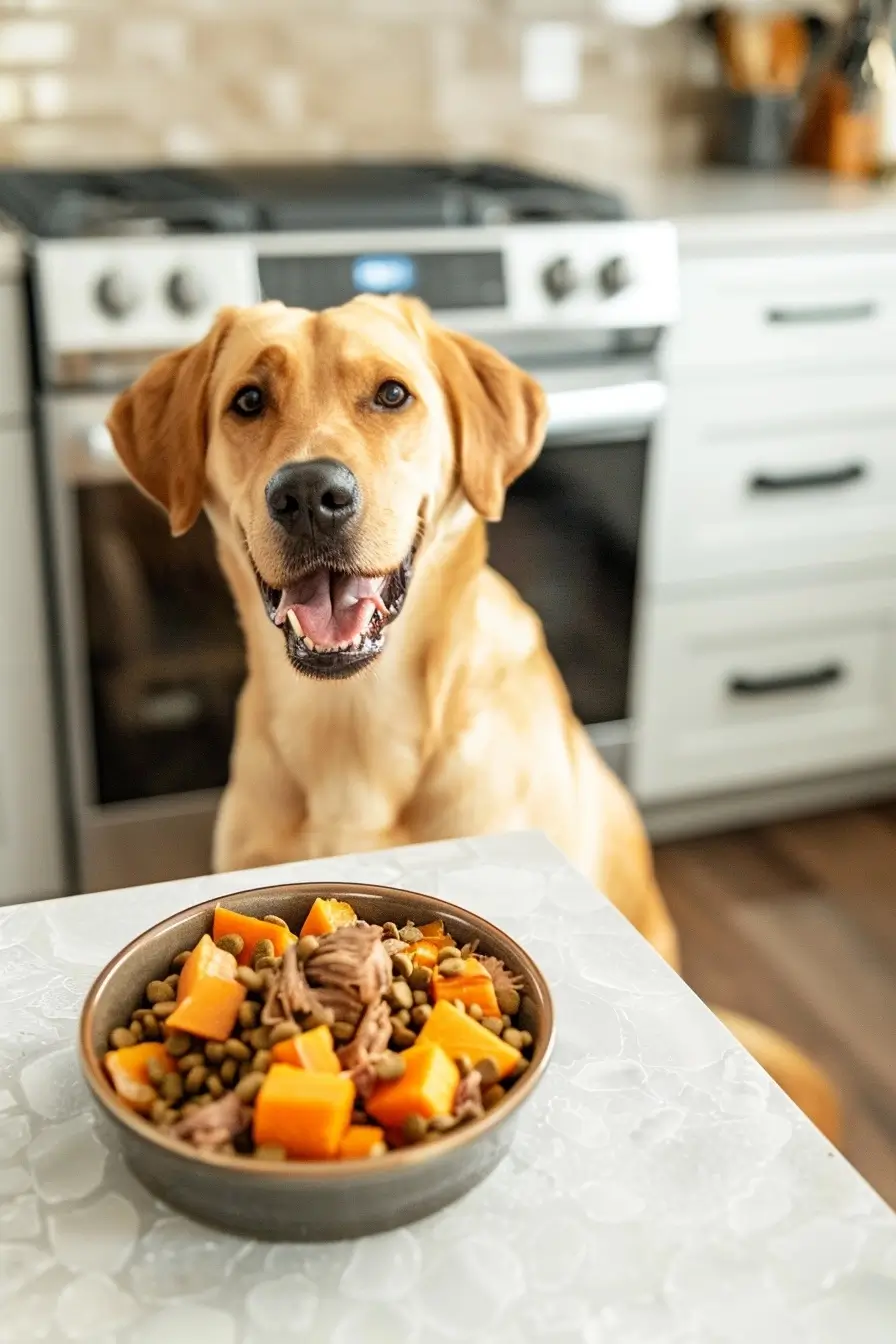Feeding your dog shouldn’t feel like a guessing game. If you care about what goes into your dog’s bowl — just like what’s on your own plate — you’re not alone. More pet parents are choosing homemade deer meat dog food recipe over kibble because they want control, transparency, and the satisfaction of knowing every ingredient is safe, fresh, and nourishing.
Among the many protein choices available for dogs, deer meat (also known as venison) is emerging as a top contender, especially for dogs with food sensitivities or digestive issues. It’s natural, nutritious, and often easier on your dog’s system than common proteins like beef or chicken.
In this comprehensive guide, we’ll show you why venison is such a great choice, how to prepare it properly, and share a vet-informed, step-by-step recipe that aligns with AAFCO guidelines. We’ll also cover feeding recommendations, substitutions, and important safety tips to make this a trustworthy, go-to recipe in your rotation.
Table of Contents
Why Choose deer meat dog food recipe
Venison is considered a novel protein, meaning it’s not commonly found in traditional commercial dog foods. For dogs suffering from food allergies, switching to a novel protein can help identify and eliminate triggers.
deer meat dog food recipe is an ideal choice for dogs who:
- Have chronic digestive issues
- Suffer from skin irritations or hot spots
- Are allergic to chicken, beef, or lamb
- Need a leaner source of protein for weight control
Here are the nutritional highlights of venison:
- High-quality, easily digestible protein
- Lower fat content compared to beef or pork
- Rich in essential B vitamins like B6, B12, riboflavin, and niacin
- Contains iron and zinc to support immune health and cellular function
According to the USDA’s venison nutrient data, deer meat is low in calories and high in protein, making it especially useful for active dogs or those on a calorie-controlled diet.
Still, feeding a dog homemade food isn’t just about meat. It must be complete and balanced. That means it should include everything your dog needs to thrive — from amino acids to calcium and trace minerals. This is where following AAFCO’s nutritional standards becomes essential. You’ll see later in the recipe that we use a DIY canine nutrient blend specifically designed to meet these guidelines.
Benefits of Venison in deer meat dog food recipe
Using venison in your dog’s diet provides both nutritional benefits and functional improvements in health. Here’s a closer look:
- Easily digestible for sensitive stomachs
- Lower in saturated fats than most red meats
- Packed with vitamin B12 for energy production
- Good source of iron, critical for red blood cell production
- High in zinc, which supports healthy skin, coat, and immune response
- Acts as a novel protein to reduce allergic responses
- Naturally flavorful and often enjoyed by picky eaters
Venison is ideal for dogs with chronic inflammation, bloating, and skin issues — common symptoms of undiagnosed food allergies or low-grade sensitivities.
Additionally, the inclusion of anti-inflammatory ingredients like cranberries, omega-3 fatty acids, and fiber-rich vegetables in this recipe ensures that every bite supports your dog’s long-term well-being.
Ingredients for Homemade Venison Dog Food

To ensure that this venison recipe is not only delicious but also nutritionally balanced, we pair it with wholesome vegetables, healthy fats, and a veterinarian-approved DIY nutrient blend.
Full Ingredient List (Makes ~11.5 lbs of food):
- 4 lbs 11 oz ground venison (85% lean / 15% fat)
- 3 lbs 2 oz butternut squash, cubed or mashed
- 3 lbs 2 oz sweet potatoes, cubed
- 15 oz Brussels sprouts, finely chopped
- 2.5 oz cranberries, unsweetened, fresh or frozen
- 4.25 oz safflower oil
- 1 tsp fish oil (provides EPA and DHA)
- 2½ tbsp DIY canine nutrient blend
Why These Ingredients?
- Butternut squash and sweet potatoes provide complex carbohydrates and fiber
- Brussels sprouts are packed with antioxidants and support digestion
- Cranberries add natural Vitamin C and help support urinary health
- Safflower and fish oil provide essential fatty acids, including omega-3s
- DIY nutrient blend fills in the gaps — especially calcium, magnesium, and Vitamin D
Tip: Always use human-grade, unsalted, and additive-free versions of each ingredient — especially cranberries, which should never contain added sugar or artificial sweeteners like xylitol (toxic to dogs).
Tools You’ll Need
- Large pot (for boiling vegetables)
- Non-stick skillet (for browning meat)
- Mixing bowl (to combine everything evenly)
- Measuring spoons and scale
- Ice bath (to preserve veggie texture)
Step-by-Step Cooking Instructions

Step 1: Prepare Vegetables
- Wash and cube the sweet potatoes and butternut squash.
- Add them to a large pot of boiling water and cook until soft (about 10–15 minutes).
- Drain and immediately transfer to an ice bath to stop cooking and retain texture.
Step 2: Cook the Meat and Veggies
- In a skillet, brown the ground venison over medium heat.
- When the meat is still slightly pink, stir in the chopped Brussels sprouts and cranberries.
- Cook for another 5–7 minutes until meat is fully browned and veggies have softened.
Step 3: Combine and Mix
- In a large bowl, combine the cooled vegetables with the venison mixture.
- Add safflower oil, fish oil, and the DIY nutrient blend.
- Mix thoroughly to ensure even distribution of nutrients.
Step 4: Store Safely
- Portion the mixture into individual servings using BPA-free containers or freezer-safe bags.
- Refrigerate for up to 4 days, or freeze for up to 3 months.
Let all food cool completely before freezing to avoid condensation and texture loss.
Feeding Guidelines
The amount you feed depends on your dog’s age, weight, and activity level. Here’s a basic guide to get started:
| Dog Weight | Daily Serving Size |
|---|---|
| 10 lbs | ¾ – 1 cup |
| 25 lbs | 1½ – 2 cups |
| 50 lbs | 3 – 3½ cups |
| 75+ lbs | 4 – 5 cups |
Adjust portions based on your dog’s energy levels, weight changes, and appetite.
Transition gradually by mixing increasing portions of homemade food with your dog’s current food over 5–7 days.
If your dog is currently transitioning from commercial kibble or recovering from an upset stomach, you may want to start with a gentler meal before switching to venison. In that case, try our chicken and rice bland dog food recipe — a simple, easy-to-digest option that’s perfect for dogs with temporary digestive issues or those new to homemade diets.
Variations and Substitutions

Not all dogs tolerate the same ingredients. Feel free to adjust this recipe to meet your dog’s unique dietary needs:
Protein Substitutes:
- Ground lamb
- Ground turkey
- Bison or elk
Vegetable Options:
- Zucchini
- Green beans
- Carrots
Important Notes:
- Do not use onions, garlic, grapes, raisins, or leeks — all are toxic to dogs.
- Always consult your vet if your dog has a medical condition or dietary restrictions.
Why Homemade is Healthier
Commercial kibble often contains meat by-products, preservatives, and low-quality fillers. Even premium brands may include ingredients that contribute to long-term inflammation, obesity, and digestive upset.
Homemade dog food gives you:
- Total control over ingredients
- Fresh, whole-food nutrition
- Transparency in sourcing and preparation
- A way to bond with your dog through food
Your kitchen becomes the source of comfort, healing, and happiness for your pet.
Frequently Asked Questions About deer meat dog food recipe
Is venison dog food good for dogs?
Yes. It’s a lean, novel protein that’s great for dogs with allergies, food sensitivities, or weight issues.
Can dogs eat raw venison?
No. Raw venison may carry parasites like Toxoplasma gondii or Trichinella. Always cook to 165°F.
What vegetables pair well with venison?
Safe options include squash, sweet potatoes, green beans, carrots, and zucchini.
How much homemade venison should I feed?
Generally, 2–3% of your dog’s body weight daily, split into two meals. Monitor weight and adjust accordingly.
Can I skip the nutrient blend?
No. Without it, the recipe is not complete and balanced. Always include a vet-approved supplement or use a tool like BalanceIT to calculate.
Final Thoughts
Switching to deer meat dog food recipe is more than a trend — it’s a thoughtful, intentional step toward improving your dog’s health, happiness, and longevity. With the right ingredients, careful preparation, and veterinary guidance, you can confidently serve meals that reflect the same love and care you want your dog to feel every day.

deer meat dog food recipe
Ingredients
4 lbs 11 oz ground venison (85% lean / 15% fat)
3 lbs 2 oz butternut squash, cubed or baked and mashed
3 lbs 2 oz sweet potatoes, cubed
15 oz Brussels sprouts, finely chopped
2.5 oz cranberries (unsweetened, fresh or frozen), finely chopped
4.25 oz safflower oil
1 tsp fish oil (omega-3 supplement)
2½ tbsp DIY canine nutrient blend (AAFCO-compliant)
Instructions
- Wash all vegetables thoroughly. Cube sweet potatoes and butternut squash.Boil the cubed squash and sweet potatoes until soft (about 10–15 minutes), then transfer to an ice bath to stop cooking. Drain and set aside.In a skillet over medium heat, brown the ground venison.While meat is still slightly pink, add Brussels sprouts and cranberries. Cook until meat is fully browned and vegetables are tender.In a large mixing bowl, combine the meat-vegetable mixture with the cooked squash and sweet potatoes.Add safflower oil, fish oil, and nutrient blend. Mix well until evenly distributed.Portion into meal-sized containers. Store in the refrigerator for up to 4 days or freeze for up to 3 months.
Notes
- Do not skip the nutrient blend — it ensures the recipe is complete and balanced per AAFCO standards.
- Always use human-grade, unsalted, and additive-free ingredients.
- Make sure fish oil is dog-safe and free from added flavorings or preservatives.
- Adjust portion sizes based on your dog’s weight, age, and activity level.

1 thought on “Homemade Deer Meat Dog Food Recipe | Healthy Venison Meal for Dogs”